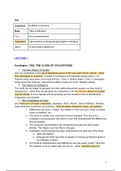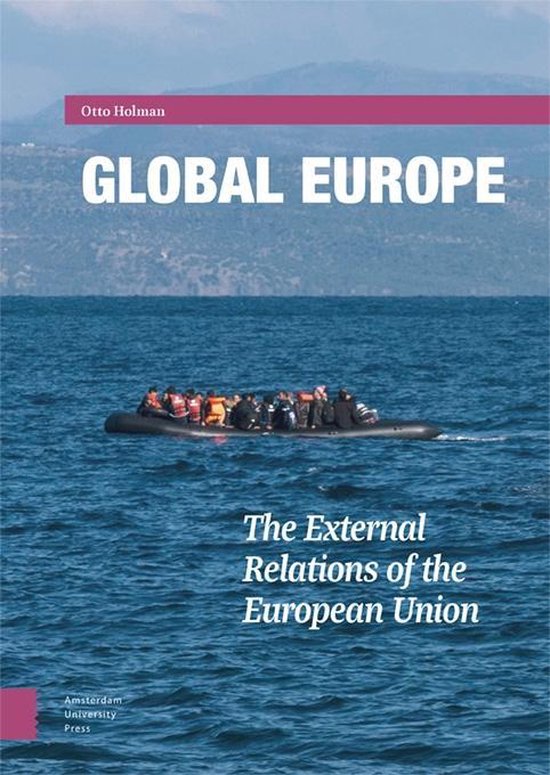Key
Underlined Subtitles in literature
Bold Titles of literature
Red Key concepts/points
Highlighted Important/key understandings/insights in literature
Italics Of secondary importance
LECTURE 1
Huntington, 1993, THE CLASH OF CIVILISATIONS
1. The Next Pattern of Conflict
(22) The hypothesis is that the fundamental source of the new world will be cultural - rather
than ideological or economic. Clashes of civilisations will dominate global politics. (23)
Previous wars have been concerning Princes = then => Nation-states = then => Ideologies.
At the end of the cold war, international politics moves out of the “Western-phase”.
2. The Nature of Civilisations
The world can no longer be grouped into their political/economic system nor their level of
development - rather they are grouped into civilisations. (24) A civilisation share no broader
cultural identity; it is the highest cultural grouping and the broadest level of identification.
Civilisations are dynamic.
3. Why Civilisations will clash
(25) There are 7-8 major civilisations; Japanese, Hindu, Muslim, Slavic-Orthodox, Western,
Latin-American, Confucian, and (African). Why will these civilisations clash - six reasons:
1. Differences are basic - religion, the relation of man and God, views on duties,
views on freedom, etc.
2. The world is smaller now, interactions have increased. This has led to
civilisation consciousness, (26) which in turn has strengthened the differences
and animosities.
3. The economic modernisation has weakened the local and nation-state
identity. The religion has then filled in this gap.
4. Civilisation consciousness has been enhanced by the dual role of the West:
a. West domination;
b. although the West has been incapable of enhancing Western ideas in
non-Western territory.
5. (27) Cultural characteristics and differences are less easily muted. Thus that
the question is not on which side you are on - rather what/who are you?
1
, 6. There has been an increase of economic regionalism of which cultural
commonalities are a cause => (28) Cultural commonalities are a prerequisite
for economic integration.
Identity is based on ethnic and religious terms which has created a us-vs.-them-perspective.
(29) The clash of civilisations occurs on two levels:
1. Violently on the micro-level over territory
2. Competition of economic and military power at the macro-level
4. The Fault Lines Between Civilisations
The cultural fault lines are the new lines for conflict and bloodshed. (30-31) For centuries it
has been so: i.e. the Orthodox-Christian divide and the Arab-Israeli divide. (32) The next
confrontation will happen at the Islamic-West divide. (33) The Nothern border of Islam is
already causing conflict: between the Muslim and Orthodox. (33-34) The clash of civilisation
also manifests itself at the Hindu-Muslim divide to the east. (34) On the Eurasian continent,
the most violent genocides have been those involving different civilisations. (35) Bold
conclusion of this section: Islam has bloody borders.
5. Civilisations Rallying: The Kin-Country Syndrome
Countries always try to rally support from their own civilisations => Kin-Country syndrome is
replacing ideology and traditional balance of power. (36) A world of clashing civilisations is
inevitably a world of double standards; people apply one standard to their kin-countries and
another standard to other countries. (38) Conflicts within civilisations are likely to be less
intense than among civilisations. The positions and cleavages of nations are increasingly
along civilisational lines. (39) The next world war, if there will be one, will be between
civilisations.
6. The West Versus the Rest
The West has no rival that corresponds to its superpower. Conflict within the West is
unthinkable. The desires of the West are presented, through the UN and the IMF, as to
represent the desires of the world community. (40) Struggles over military, economic and
institutional power between West and non-West is one source of conflict. Another source of
conflict is the differences is basic values and culture. Western (democratic) concepts have
little resonance outside the West. (41) The very idea of a universalist civilisation is a western
idea. The values that are most important in the West are the least important worldwide.
Conflict in the future is likely to be the West against the rest. Three alternatives for the rest:
exclusion (however, costs are high), band-wagoning (an attempt to join the West and
accepting its values and institutions) or balancing the west - to modernise but not yo
westernise.
7. The Torn of Countries
(42) Torn Countries are countries that are torn; should they be a member of one civilisation
or the other? They usually are more or less homogenous - and it is usually the elite vs. the
public. An example is Turkey. The leaders usually opt for the Band-Wagoning strategy, but
the members are simply not Western. (43) While Turkey is the torn-country of Europe,
Mexico is the torn country of North-America and Russia is the torn-country globally. (44) For
a torn-country to redefine its civilisation identity, it must meet three requirements:
1. The political and economic elite must be supportive of this move
2. The public must be willing to redefine under these lines
3. The dominant group in the recipient civilisations must embrace the convert
2
, (45) If Russians stop behaving like Marxist and begin to behave like Russians - but not
Westerners - the relation between Russians and Western could again become distant and
conflictual.
8. The Confucian-Islamic Connection
Japan is an associate member of the West. It is in the West in some respects and clearly not
in other respects. While Western countries and Russia are reducing their military power;
China, North Korea and several Middle Eastern countries are expanding their military power.
They are importing weapons from weapon states (emerging). (46) The post-Cold-War
arms-control is in terms of ensuring that no non-Western state can threaten Western
interests. This the West does through international agreements, economic pressure, and
control of the transfer of arms. “Don’t fight the United States unless you have nuclear
weapons”. (47) The flow of weapons is generally from East Asia to the Middle East. A new
form of arms competition is occurring between Islamic-Confucian states and the West.
9. Implications For the West
(48) International relations will increasingly be de-Westernised. International institutions will
more likely develop within civilisations and not across. The most violent wars will be fought
between civilisations. The paramount axis of world politics will be the “West-vs.-the-rest”.
This article does not advocate conflict between civilisations, rather it is a descriptive
hypothesis. (49) Nations (as Japan did) will attempt to become modern without becoming
Western. FOR THE RELEVANT FUTURE, THERE WILL BE NO UNIVERSAL
CIVILISATION, BUT INSTEAD A WORLD OF DIFFERENT CIVILISATIONS.
J/S/M - Chapter 1 - Why Study IR?
1. International Relations in Everyday Life
International Relations covers the interactions and relations between states, IO’s, MNC’s
and NGO’s. It is also an interdisciplinary inquiry. The international system which states form
is the core subject of IR. The State system refers to an organisation of independent states
wherein mutual sovereignty is recognised.
There are five basic social values that a state is expected to uphold: security, freedom,
order, justice, and welfare.
The security dilemma refers to the paradox that states must both defend and threaten
people’s security. The balance of power, is the idea that states are characterised as rivals
and the idea that states periodically go to war with each. Both the security dilemma and the
balance of power are integral to realist theories.
Peace and progressive change is integral to liberal theories => States cooperate for peace
and freedom.
International society Theories act on the assumption that states act in a system of socially
responsible actors that have an interest in order and justice.
International political-economic theories operate on the assumption that international
relations can be understood primarily as a socioeconomic world.
The First World War paved the way to the first major development of IR; finding effective
legal institutions (The League of Nations). The Second World War led to the understanding
that appeasement can have grave and regrettable consequences. States wish to masters of
their own fate. Suffering undermines the legitimacy of the state system and causes the
alternative or revisionist views: people suffer more than they benefit from the state system.
3






